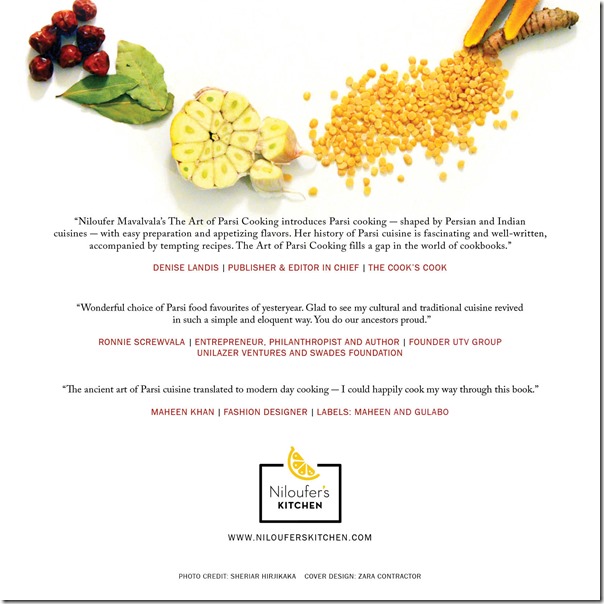The launch of a new book is always a happy event. But when one knows the author personally, the books become even more dear. That is the case with the upcoming book by dear friend of Parsi Khabar, and amazing chef Niloufer Mavalvala. We have featured Niloufer’s cooking, cookbooks and other food related news on Parsi Khabar since she started nilouferskitchen.com
Regular Parsi Khabar readers will also remember Niloufer being featured in our Everyday Parsi Series in 2015
Below is an article by Nasha M written about Niloufer’s book, and an excerpt from the book
In an age of over-information, it is easy to get overwhelmed with the millions of recipes and a torrent of cookbooks flooding the culinary world. Out of this sensation, one chef and author stands out, whose wish is to revive an ancient cuisine. As such, she has managed to beautifully combine tradition with creativity to create something truly unique.
This book is dedicated to her late father Dr. Jamshed H. Wania to mark his 25th death anniversary and celebrate his rewarding life. It is her sincere wish that The Art of Parsi Cooking: Reviving an Ancient Cuisine will stand out and inspire chefs, new and experienced alike, and become a valuable addition to kitchens across the globe for generations to come.
Excerpt from the book
The Art of Parsi Cooking; Reviving an Ancient Cuisine
by Niloufer Mavalvala
Originating from what was once the Persian Empire, Parsis are the followers of Prophet Zarathushtra, who was born in Airyana Vaeja in the foothills of the mountains in Central Asia. Zoroastrianism was revealed 3,500 years ago by this prophet and was the first monotheistic religion known to mankind. In spite of its being so old, it is a living religion for about 200,000 Zarathustis who practice their faith around the world. Many fled Persia and migrated to India 1,200 years ago in the 9th century. They landed on the shores of Gujarat where they were accepted on the strict condition that they were not allowed to seek converts, and there they began a new chapter for themselves. This small community of Zarthustis were then called Parsis by the locals. Today, as the Parsi community the world over faces extinction, it is also facing questions from within its community on how to ensure the continuation of their religion and culture.
Parsi cooking has been shaped by two ancient cultures— Persia, where Parsis originated, and India, where they later settled. This unusual historical background gives Parsi foods a distinct and unique flavor. Recipes with nuts, dry fruits and shirini (sweet) within them originated in Persia, while ginger, garlic, chilies and spice add Indian flair. Centuries-old foods like saffron, jaggery and vinegar as well as ginger, cinnamon and turmeric– all staples in Parsi cooking—are celebrated in modern times for their health benefits.
Although its population is small, the Parsi community has a high number of achievers in all walks of life. Doctors, lawyers, philanthropists, accountants and activists, government officials and teachers, have left an indelible mark, especially in India. Parsis, well known for their love of art and music, include the late Freddy Mercury of the band “Queen” and Zubin Mehta of the Israel Philharmonic Orchestra. Bollywood has also been entered into by the Parsi community, with entrepreneur Ronnie Screwvala leading it into a firm bond with Hollywood.
With the world migration of Parsis at its highest in the past 50 years, members of our community have spread themselves in small numbers all over the world. Most have relocated to North America with large numbers in Canada (particularly Ontario and British Columbia) and the USA (particularly, New York, California and Texas, as well as Massachusetts and Illinois). Australia and New Zealand also have a fairly large Parsi population. Most of these community pockets have built themselves large Zoroastrian Centers in recent years, a defining sign of a permanent settlement anticipating generations to come.
Home is also where the food is. Meat and eggs are two favorites Parsi foods, and garlic, ginger, onion and tomato can be found in most recipes. Spices include cinnamon, turmeric, cumin, and chilies, and jaggery (unrefined brown sugar) and vinegar give a finishing touch. Tikhu-Khatu-Mithu (Spicy-Sour- Sweet) is considered the Holy Trinity of Parsi cooking, and perfecting its balance is the key to any Parsi dish.
The book can be pre-ordered on Amazon now
The book launch is in London U.K. at the end of this month
at
Books for Cooks,
4 Blenheim Crescent, London W11 1NN
on
Thursday 28th July 2016 at 5.30pm

